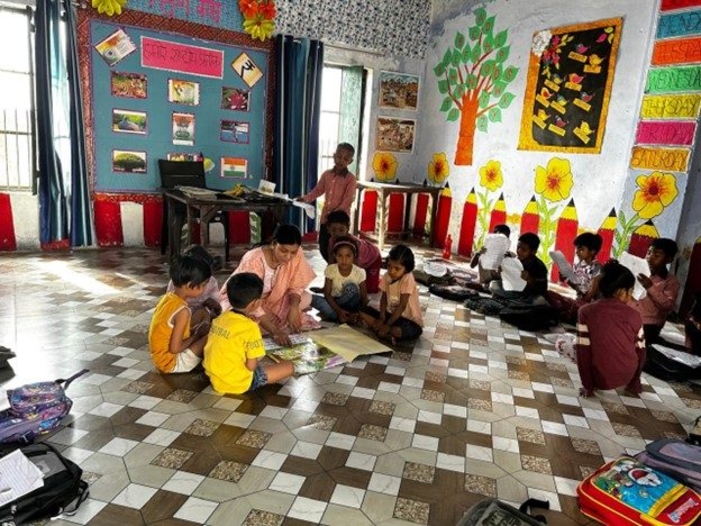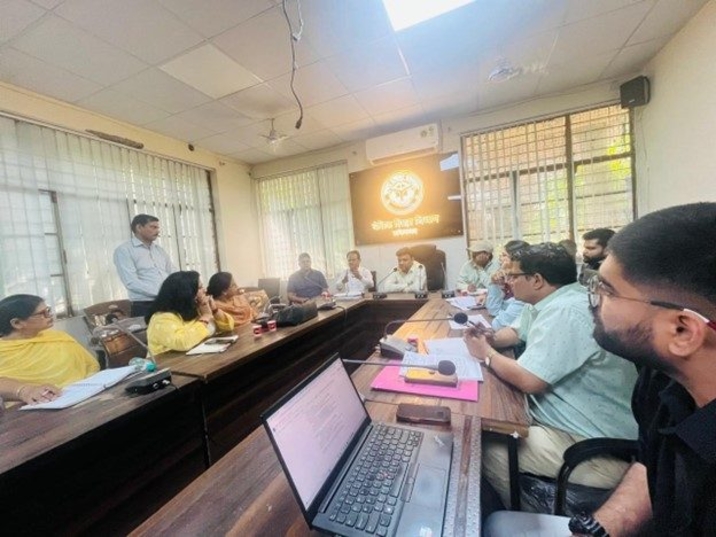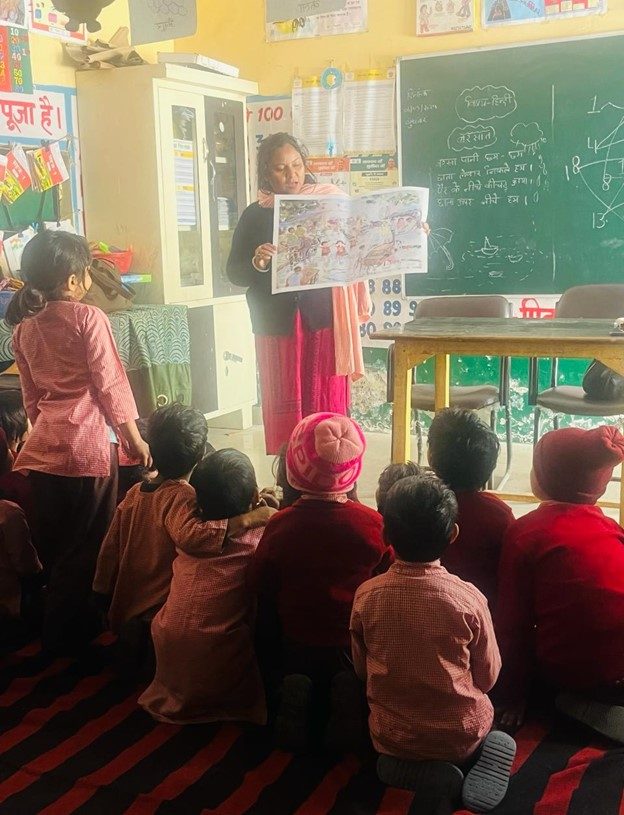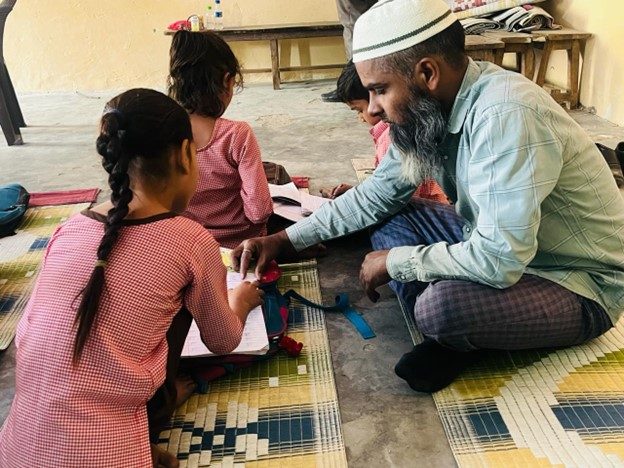 Go Back
Go BackShare
Giving Impetus to NIPUN Bharat Mission at the District Level — In Conversation with Om Prakash Yadav (BSA – Ghaziabad)
By CSF
Apr 30, 2024
With the NIPUN Bharat Mission continuing to pick up steam in the Ghaziabad district of Uttar Pradesh, we hear from Sh. Om Prakash Yadav as he talks about the criticality of such an initiative for improved student learning. He also speaks about his role in driving change to strengthen teaching and learning in the classroom and shares key district priorities for the academic year 2024-25.
Ghaziabad has been working in mission mode under NIPUN to ensure that all children from Balvatikas to Grade 3 in the district build critical literacy and numeracy skills. Our team met Basic Shiksha Adhikari – Ghaziabad, Om Prakash Yadav, to understand his views on the Mission, the role he sees himself playing in it and his priorities for this new academic year.

Q, What is the importance of the NIPUN mission initiated by the Central Government for our children?
With the efforts of Sarva Shiksha Abhiyan and then the Right to Education (RTE) Act, we have been able to get almost all our children in schools. As a nation, we have made schools accessible to children in all parts of the country. It is now our responsibility to ensure that the children are learning critical life skills. Launched at the national level and then at the state level, the NIPUN Bharat Mission is aimed at ensuring a strong foundation for the future of our country by focusing on building a strong education foundation for our young ones. Considering the critical roles early years of learning play in the lives of children, this Mission promises to build a solid foundation for children by emphasising on foundational literacy and numeracy.
The goals of the Mission ensure that our students are not only moving forward grade-wise but also competency-wise. There is a huge emphasis on competency-based learning with clear targets for literacy and numeracy from Balvatika to Grade 3 that we must help children achieve.
Time and humans are the two most important capitals in any society; through the NIPUN Mission, we are investing in both positively. The success of this initiative will ensure that all children succeed in the rest of their academic journeys and in life.
Q. What are some of the district’s responsibilities towards the Mission?
District has the key responsibility to ensure that mission implementation is done well and goals are achieved in the given timeframe. We are both, at the forefront of implementation as we directly engage with academic and administrative units, as well as playing the role of nodal points for the state to provide timely feedback on Mission progress.
There are multiple decisions we make on a day-to-day basis in service of the NIPUN Mission and I want to talk about 2-3 critical ones here:
Firstly, the district is tasked to provide administrative and academic support to teachers. We share the goals with everyone in the district, ensure our teachers and BEOs understand the importance and goals of the Mission and focus on building their capacity to achieve those goals.
Secondly, the district has to work towards ensuring that the progress is continuously monitored. We ensure that all the ARPs, SRGs, DIET mentors play their roles well. Mission guidelines require us to set up a district-level NIPUN task force that closely works on the Mission. In Ghaziabad, we have periodic reviews at DM Sir, CDO Sir, and my levels to understand how we are performing as a district.
Lastly, the district acts as an important unit to ensure that all the state-level communication is streamlined and conveyed to the blocks and schools. This helps in alignment of goals, priorities and regular updates to everyone working in the district.

Q. How do you allocate time and bandwidth to make this Mission a priority in the district?
Basic Shiksha is my key priority in the district. I have been working on ensuring that all children in our government schools get high-quality education, our teachers feel supported and motivated and our BEOs, mentors are doing their roles well.
Even before the Mission, I have always been focused on children learning well.
Sh. Om Prakash Yadav (Basic Shiksha Adhikari – Ghaziabad)
After the NIPUN Bharat Mission came in, I have been giving strong emphasis on children in grades 1-3 as we have limited time to make them NIPUN. I conduct weekly “Baithaks” with BEOs, DCs, SRGs and the NIPUN Cell team in order to stay up-to-date with the ongoing progress. Whenever I visit schools, I make sure that I interact with children and teachers and understand how they are learning.

I attend all critical meetings under the guidance of DM Sir and CDO Sir along with ARPs, BEOs, SRGs to align on progress and share inspiration and challenges. My team reviews data on a periodic basis and that helps me create strategies to improve learning.
Q. What are some initiatives taken by the district to ensure children’s foundational skills are strengthened?
Apart from regular trainings, reviews and support offered, we also identify sincere, hardworking teachers and mentors who are high-performing and we recognise them at a district level for their efforts. We also celebrate the achievements of innovative teachers in the district who are doing well.
My belief is that we need to motivate, upskill and empower our teachers and that will result in better learning for children. We also undertake innovative approaches to solve some specific issues that we see in student learning. For example: Recently, our Bhojpur block team executed a six-week programme to reduce the number of ‘Sangharsheel‘ students by 10 or more per cent. After an impressive campaign led by BEO, ARPs and SRGs with the support of the NIPUN Cell team, our block teachers were not only able to achieve the set target but surpassed it by delivering 15% improvement.


Q. What areas do we still need to work on to ensure this Mission is implemented well?
I believe one of the things we are making a priority is to increase the attendance of the students in FLN grades. We have been trying to help parents and community members understand the Mission and encourage them to send their children regularly, but it is an area that still needs a lot of work. While the situation has gotten better through the consistent efforts of teachers and SMC members, there is still a long way to go. Our schools are getting better, we are focusing on learning and there is a huge emphasis on making sure that maximum children get the benefits of schooling. This mission will be a big step in getting parents to see the value in sending children to school every day.
Q. The academic year has just started – what will be your 2-3 big priorities for the year for Ghaziabad?
My team and I will keep focusing on making children NIPUN and building a greater sense of ownership and commitment among teachers. We have made good progress so far and it will be important to maintain it. The other priority will be to ensure that we increase enrollment and attendance across all our schools. I am also focusing on allocating some of our best teachers to work with children in grade 1 so that they receive prioritised support as soon as they enter school.
Keywords
Authored by
CSF
Central Square Foundation
Share this on
